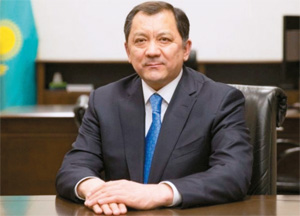Exclusive
New Ministers of Energy and Ecology, New Mayor in Mangystau
The autumn political season in Kazakhstan has started with personnel changes in the Government and at the local level. In early September, the country replaced the Ministers of energy and ecology and the mayor of one of the main oil-producing regions – the Mangystau region.
Mayor of Three Regions

On September 7, Nurlan Nogayev, who was released from the post of Minister of Energy of the Republic of Kazakhstan by presidential decree, was presented as the new Head of the Mangystau region. A unique case, as Mr Nogayev was the only one who managed to lead all three oil-producing western regions of the country. In 2012, he replaced his long-term patron, mentor and boss Baktykozha Izmukhambetov, who was appointed mayor of the Atyrau region, as the mayor of the West Kazakhstan region. Four years later, when Izmukhambetov left for the Mazhilis of the Parliament, Nogayev moved to the Head's office in Atyrau, from where he flew to Nur-Sultan in December 2019 to the ministerial chair. And now the mayor of the Mangystau region, which is perhaps the most problematic of all three. This year, for several months, workers of various mining and oil service companies have been on strike in the region, demanding a salary increase.
Kanat Bozumbayev, now an Assistant to the President of the country Kassym-Jomart Tokayev on oil and gas issues (and, according to information from the sidelines, an opponent of Nogayev), during the three years of leadership of the Ministry, was able to solve many long-standing problems of the industry, the main of which was the provision of the domestic fuel market. Under his leadership, the modernization of the oil refining industry, which lasted for 11 long years, was finally completed. All three domestic refineries were radically modernized. As a result, the processing capacity increased by 20%, the production of gasoline by 70%, diesel fuel by 20%, and jet fuel by 2.4 times. With the completion of modernization, the country has completely covered its domestic needs for gasoline and diesel fuel for the first time in the years of independence.
But he left several problematic issues to his successor. The main one is the retail prices of gasoline and diesel fuel, making it unprofitable for oil producers to supply oil for refining inside the country. Considering that Kazakhstan is making leaps and bounds into the common market of oil, gas and petroleum products of the Eurasian Economic Community, the prices of gasoline, diesel fuel and liquefied gas should inevitably rise, if not to the level of the world, then at least to the Russian ones.
It is clear that this topic is painful, threatening social discontent, and therefore it is not surprising that no minister is eager to put his reputation on the line for the sake of solving this issue. Nurlan Nogayev is no exception. He only accelerated the process of liberalizing the fuel market by launching exchange trading in liquefied gas and, so far, small volumes of gasoline. And as a counteraction to the flow of fuel to neighbouring Russia, where its price is much higher, the mechanism of border closure was actively used.
In the spring of 2019, Minister Bozumbayev stated that Kazakhstan would start exporting domestic gasoline in the first half of the same year. As a result, it started later (see Delayed Start, Petroleum, No. 6 (120), December 2019). According to statistics, in 2020, 493.6 thous. tons of gasoline were exported from the country (in 2019 – 180.7 thous. tons) and 175.9 thous. tons of diesel fuel. Uzbekistan became the largest importer of Kazakhstani oil products last year, where almost half of the volumes were shipped. Deliveries were also made to Kyrgyzstan, Tajikistan and Georgia. Kazakhstani gasoline in the amount of 46.3 thous. tons was exported to Europe through the Russian ports of Taman and Novorossiysk.
Minister Nogayev continued and completed the solution of several more problematic issues. Under his leadership, a profit-sharing dispute with the shareholders of the Karachaganak Consortium was completed. On December 14, 2020, the signing of an Agreement on the completion of the Dispute Settlement was announced. Within the framework of this Agreement:
- the KPO consortium makes a financial payment to Kazakhstan in the amount of 1.305 bln US dollars;
- the parties agreed on the final method of production sharing, as a result of which Kazakhstan will receive an additional $600 million by 2037 at an oil price of $40-50 per barrel;
- the parties approved the start of the implementation of the Karachaganak Expansion Project (KEP-1) to maintain production levels at the field further.



